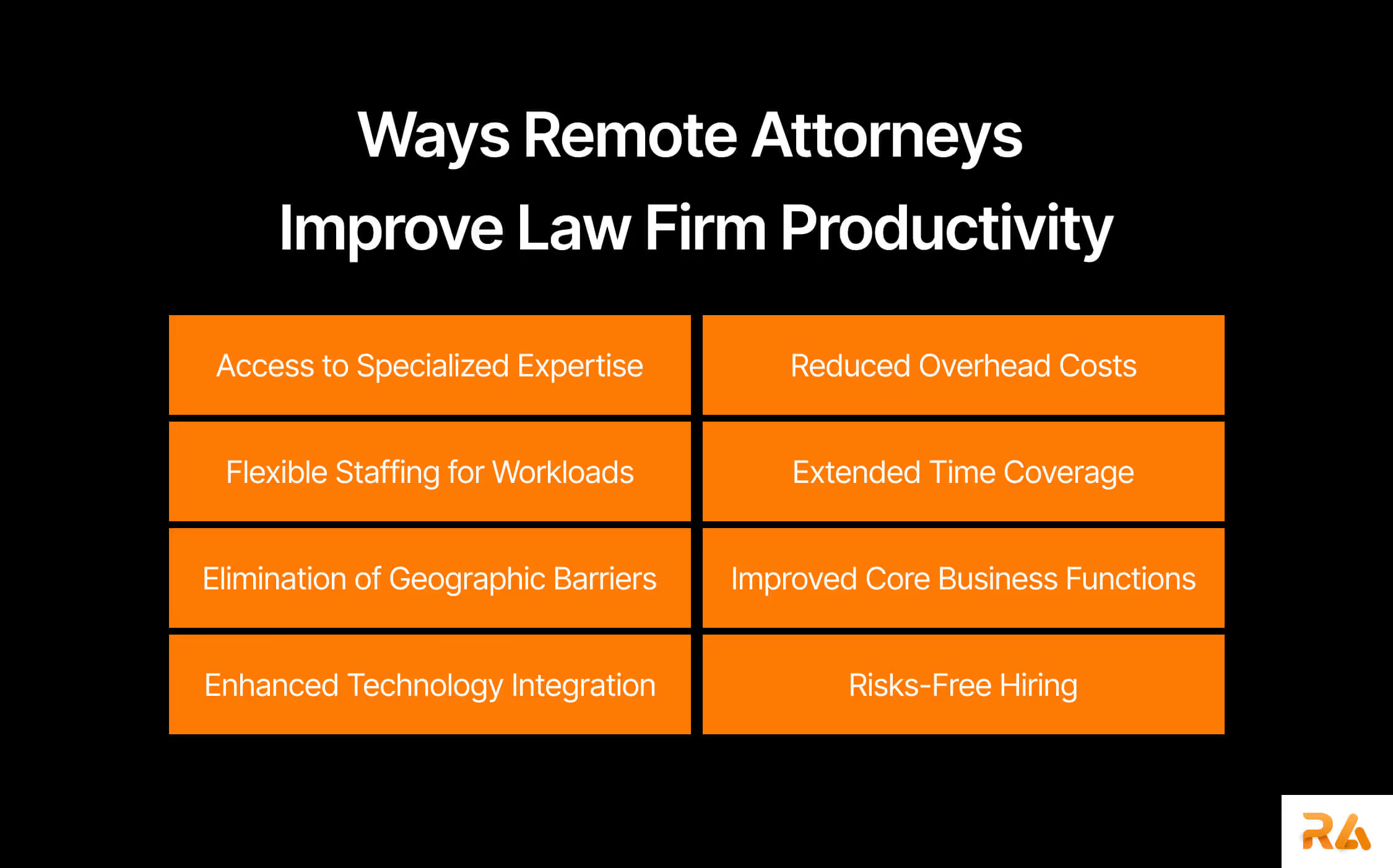It's safe to assume that every attorney, regardless of firm size, aspires to become more productive. The challenge lies in balancing client expectations with operational realities including managing heavier caseloads, controlling costs, and maintaining quality standards while competing in an increasingly demanding market.
As law firms search for sustainable solutions, many are turning to remote attorneys as a strategic resource. Beyond the obvious cost benefits, remote legal professionals bring massive benefits that give you the ability to scale your practice precisely when you need it. This approach allows you to focus on what you do best while building a more resilient and productive firm for the future.

1. Access to Specialized Legal Expertise
When you need a specialist in immigration law or complex tax litigation, hiring a full-time expert isn't always practical. Remote attorneys give you access to specialized knowledge exactly when you need it.
Instead of turning away cases outside your expertise, you can work with attorneys who focus exclusively on specific practice areas. This approach lets you expand your service offerings while maintaining the quality your clients expect. You can take on more diverse cases, charge appropriate fees, and build a reputation for handling matters across multiple legal fields.
2. Reduced Overhead Costs
Traditional hiring can easily double your actual labor investment with expenses like office space, equipment, benefits, and insurance. Remote attorneys eliminate these overhead costs.
You pay for legal work, not office rent or equipment depreciation. The savings go beyond direct costs. You’ll spend less time on administrative tasks and office management, which translates into more billable hours and improved profit margins.
3. Flexible Staffing for Variable Workloads
Legal work rarely follows predictable patterns. A litigation case might require intensive research for months, followed by minimal activity. Volatile practices like personal injury experience workload fluctuations throughout the year.
Remote attorneys provide the flexibility to scale your team up or down based on actual needs. During busy periods, you can quickly add staff without bearing fixed personnel costs during slower times. Whether you need a contracts attorney for two weeks or research support for a project, remote arrangements let you match resources precisely to your requirements.
4. Extended Time Coverage
Client expectations for responsiveness continue to increase. While you can't work around the clock, remote attorneys in different time zones can extend your firm's effective operating hours.
A remote attorney on the West Coast can continue working on your East Coast projects after hours, or international remote attorneys can provide overnight research and document review, so you can present results to clients first thing in the morning.
This extended coverage improves client satisfaction and can provide huge advantages in time-sensitive matters. You're not just faster; you're available when your clients need you most.
5. Elimination of Geographic Barriers
The best attorney for your specific needs might practice in another state or country. Traditional hiring limits you to candidates willing to relocate or commute. Remote work removes these geographic constraints, giving you access to qualified attorneys anywhere and expanding your talent pool significantly.
Geographic flexibility also helps with client coverage. If you have clients in multiple jurisdictions, remote attorneys familiar with local laws and procedures can provide valuable insights without the cost of maintaining physical offices in every location.
6. Improved Focus on Core Business Functions
Managing traditional legal teams requires significant administrative attention that could be spent on legal work or business development.
Remote attorneys typically require less oversight. They're experienced professionals accustomed to working independently and delivering results without constant supervision. This independence frees you to focus on activities that directly impact your firm's growth and profitability.
7. Enhanced Technology Integration
Remote attorneys are typically early adopters of legal technology. Working remotely requires proficiency with cloud-based systems, document collaboration tools, law firm productivity tools, and digital communication platforms.
Working with them can introduce you to new tools and workflows that improve your firm’s overall efficiency. They bring experience with systems you may not have considered and can help identify process improvements.
This level of tech integration creates long-term benefits, positioning your firm to compete in an increasingly digital legal marketplace.
8. Risks-Free Hiring
Growing your firm traditionally means making major commitments before you know if the growth will be sustainable. Office space, employee benefits, and utilities purchases create fixed costs that continue even if business slows down.
Remote attorneys let you explore new practice areas and expand your client base without those risks. You can test new hires on a project basis before committing long-term. This approach lets you scale as revenue increases, without making large upfront investments.
Frequently Asked Questions about Remote Attorneys
What task can remote attorneys do?
Remote attorneys can handle legal research, document review, contract drafting, compliance, and case prep. Many also offer niche services like estate planning or immigration support.
How do you ensure quality control?
Use clear project specs, deadlines, and communication protocols. Start with small tasks, review samples, and check references. Provide feedback and hold regular check-ins to maintain quality.
What about client confidentiality and data security?
Professional remote attorneys use encrypted tools and follow strict confidentiality standards. Verify their security practices and agreements before engagement.
How do you manage communication and collaboration effectively?
Set communication protocols early. Use tools like video calls, shared docs, and project tracking platforms. Agree on response times and meeting schedules to keep collaboration smooth.
Higher Productivity. Lower Costs.
The legal profession is transforming fast, and firms that adapt to new working models are the ones that gain a competitive advantage. Your firm's success depends on delivering excellent legal services efficiently to drive profitability. Remote attorneys help you achieve these goals by providing the right expertise at the right time.
Explore how remote attorneys can enhance your firm's productivity. Take the next step by signing up to access a network of thousands of attorneys across all practice areas who can help you bring the expertise you need.


.webp)

.webp)